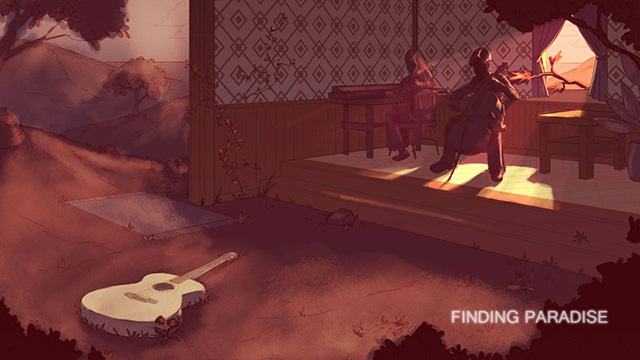Finding Paradise: Clicking at Your Heartstrings

Storytelling in video games can hit a broad range of emotions. Many of us can remember where we were and how we felt when we watched Sephiroth run through Aerith in the Forgotten City when we first played Final Fantasy VII. Strong storytelling add spice to a game with somewhat plain gameplay, leaving a strong end result that leaves a lasting memory. Finding Paradise does just that, focuses on the importance of memories, and how we use them to see the world around us.
Finding Paradise is a point-and-click adventure game made by Freebird Games, which rose to the public eye with its other title, To The Moon. In 2011 when To The Moon was released, it was met with raving reviews due to its complete focus on a personal, heartrending story with minimalist gameplay elements. Finding Paradise is no different in execution.
The game follows scientists Dr. Eva Rosalene and Dr. Neil Watts, whose job serves as a sort of mental hospice service that grants dying patients their last wishes by allowing them to live them. How do they do it? By jacking into their minds and altering their memories to make the soon-to-be departed believe they have achieved their unobtainable life goals. Obviously as many science fiction stories involving memories and melding of the minds go, not everything goes as planned. What Finding Paradise does is put you as the observer in someone else’s entire life, starting from childhood and going up to their dying breaths. Its sober method of storytelling, with dashes of comic relief from your protagonists, makes you reflect on your own regrets and past, allowing you to relate to the artificial life displayed to you. There aren’t many games out in the market, especially the indie side, that the player can sit back and take a emotional break from what they’re experiencing.

Actual gameplay in Finding Paradise is sparse, taking a backseat to its deep and engrossing story instead. Each memory “slice” is made of exploring the world, spanning locations central to the client. You control the pair of doctors with a simple point-and-click interface, discovering memory cores to progress, all the while witnessing what memory resides in said cores. In between slices are simple slider puzzles to “unlock” the next slice. You won’t find any combat in this title, which may lend itself as a turnoff to some players. Without the powerful story, the game’s mechanics would seem tedious and boring without much else to keep you. It’s the journey itself that harkens back to PC adventure games of the late 1980s to early 1990s, when gameplay was focused more on uncovering secrets than blasting baddies.
Powered by RPG Maker, you won’t find awe-inspiring displays of graphical fortitude, since the tale of a dying man’s memories is told in 16 bit. Most backgrounds are made of simple tile work and simple character models running through the world.
What you will find however is a magical musical score that deserves to be heard more than once on its own. Each memory is paired with a score that enhances the emotion you feel while digging through it. Somber moments are met with a piano accompaniment that puts you in the same emotional turmoil as the characters on screen. One song from the OST named “Where Are You” is a beautiful duet on piano and cello that’s reflective of the characters that play the song together, and in turn ties the scenes they share together as well.
Finding Paradise is an excellent story-based adventure game that would fit perfectly in anyone’s collection. While not for anyone, Finding Paradise does what Freebird Games intended. It tells a story of regret, loss, and what a memory really is to a person’s reality. This game is currently on Steam, GoG.com, and the Humble Store for purchase. If you’re interested in more of Freebird Game’s works, visit their website at www.freebirdgames.com.
[divider]




